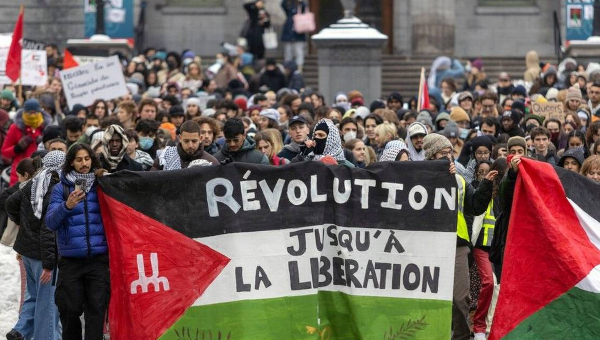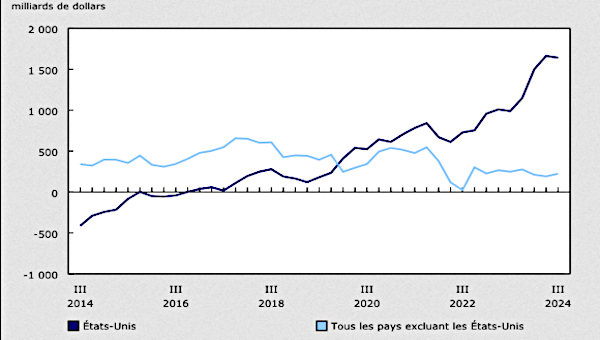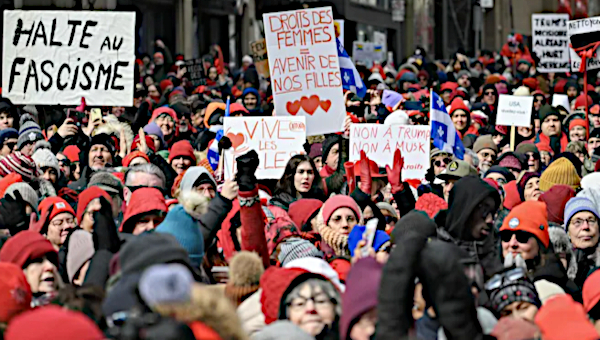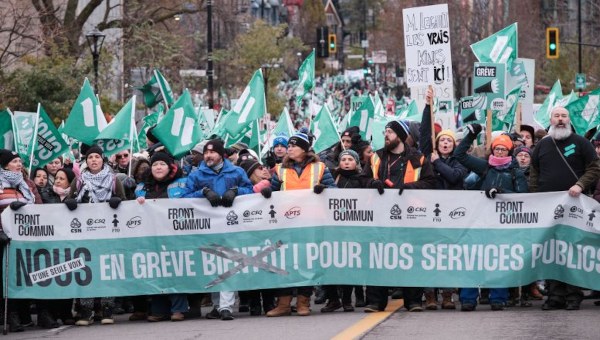Crumbling Bloc?
Watching the Bloc Québécois over the past decade is a little like watching a bullfight. You know that the bull is going to die, but not on what particular charge. And, as with a bullfight, I do not relish applauding the result. A rapid overview of the Bloc’s formation and achievements provides some context for assessing its current predicament, and the effects of its potentially imminent demise.
The Bloc was formed at the death of the Meech Lake Accord constitutional amendment in June 1990 by former Conservative and Liberal MPs. For these MPs, the failure of the Meech Lake Accord signalled that Quebec’s vision of what Canada is, namely a partnership of peoples where each guards a significant degree of decision-making autonomy, could not find space in Canada’s constitutional order. It therefore started as a loose assemblage of centre-right nationalist politicians who were at least nominally federalist. It was the disappointment over the closure of Canada’s constitution to Quebec nationalism that led to the strategic decision that Quebec sovereignty was now the only way to escape the constitutional blockage. With the former Conservative cabinet minister Lucien Bouchard as leader, who Quebec public sector workers might also remember for his role in the confrontations over the vicious 1982 public sector wage cuts, the Bloc initially appeared to represent a more nationalist version of the old Créditistes.
The class character of the Bloc nevertheless changed with the election of Gilles Duceppe in a 1990 by-election, with a substantial influx of social democratic MPs in the 1993 federal election, and with the clear support on the ground by the labour movement and the broader left. In tandem with the Parti Québécois’ strategy of building an inclusive nationalist coalition in the run-up to the 1994 provincial election (and subsequent 1995 referendum), the Bloc defined itself as a progressive alternative to the neoliberalism of the Chrétien Liberal government. It also came to have a much more resolutely sovereignist cast: it was no longer simply the party of federalist nationalists dismayed with the failure of Meech, but also the party of separatist nationalists who never harboured any illusions about (or much interest in) a Canadian project.
Tensions Within
In a period where the NDP had lost official party status, the Bloc became the voice of (semi-)social democracy. The question of nationalism meant it did not always play that role effectively, as it did not maintain a rich dialogue with the left in the rest of the country, nor did its ideas get much play in the English press. But it did provide a door into Parliamentary committees for labour and social movement representatives, as well as an organized counter-program emphasizing trade union rights and a positive role for public services. Its main blind spot was the relationship with the United States, where the strategy of getting closer to the States as a means of facilitating a break with Canada led to unfortunate embrace and celebration of the current trade agreements, as well as an ongoing flirtation with monetary union. As an opposition party, the Bloc never had to reconcile how its social democracy and its critique of Canadian foreign policy fit with its embrace of the American Empire, but there were clearly tensions in that juggling act. And given the recent record of social democracy, it is not hard to guess how those tensions would be resolved.
With the failure of the 1995 referendum on sovereignty, the Bloc lost its original purpose, which was to protect Quebec’s interests in Ottawa leading up to the referendum. It nevertheless successfully contested the subsequent elections – and while signs of its loss of appeal to voters continued to manifest, the ability of the federal government to disappoint Quebecers, such as through the sponsorship scandal, regularly bailed the Bloc out. Indeed, even if this election proves largely disastrous for the Bloc, all it might take is a scandal for it to at least partially bounce back. Yet across this period, the Bloc changed to become more programmatically social democratic and to emphasize the inclusionary nature of the Quebec sovereignty project. From election to election, its more conservative and less urban MPs slowly made their way out of the picture. But as they left, the Bloc seemed unaware that its ideas were not resonating outside Montreal, and were unable to come up with social democratic strategies adapted to the unique challenges (demographic decline, deindustrialization, job shedding) of Quebec-outside-of-Montreal.
But if the formation of the Bloc involved grafting a mass base of social democrats and separatists onto a Parliamentary party of disappointed federalists of the centre-right, its decomposition followed the reverse order. A key moment here was the shift on the right outside of Quebec. As long as the Reform party and Alliance vilified Quebec nationalism and punished parties (like the Progressive Conservatives or the NDP) who attempted to reach out to federalist nationalists, the electorate remained polarized between the BQ’s sovereignty and the Liberals’ status quo federalism. But once the united Conservatives decided to court Quebec nationalists, without fear of another party playing up a reactionary Canadian nationalism in the rest of the country, the Bloc could no longer play on that polarization. And it was ultimately its founding core of centre-right federalist nationalist voters who were at play. As Meech Lake and Charlottetown receded into memory, this group was willing to once again engage with a Canadian project, at least as long as sovereignty was not on the immediate agenda.
In this task, the Conservatives benefited from the growing Montreal/rest-of-Quebec cultural divide. Right-wing talk-radio hosts could position the conservatives as more attuned with the concerns of people compared to a Montreal cultural and political elite which could only look at the rest of the province in condescension, when it looked at it at all. To the Bloc’s credit, it has ignored calls to pander to right-wing populism to reclaim this electorate. To its great discredit, it has been unable to articulate an alternative vision of regional development and cultural representation that might break the lock of conservative political appeals.
What is left of the Bloc is a mass base of separatists, who are by and large social democratic in orientation. It is not difficult for the largest union central, the FTQ, to endorse the Bloc despite some notable slips such as opposing a $10/hour minimum wage for federal employees or supporting the softwood lumber deal. And barring a disaster, the Bloc will elect a strong but somewhat smaller parliamentary contingent, concentrated in but not limited to the eastern part of the Island of Montreal and surrounding francophone suburbs. The big question for the social democratic left at that point is what action to take to prevent the further shrinkage of the electoral successes made under the Bloc banner.
Perspectives
Let there be no misunderstanding: Quebec nationalism is not disappearing. If I liken the Bloc to the bull at the bullfight, it is because the Bloc is the bearer of the nationalism formed in the crucible of the 1990-1995 nationalist upsurge – a social democratic nationalism aiming at an inclusive definition of the Quebec nation. After the loss of the referendum, it continued to bear this project, but the base beneath it was frittering away. As the Parti Québécois government adapted to the ambient neoliberalism and developed its own form of competitive austerity (the vaunted “Quebec model”), and was then relegated to third party status by the right-wing Liberal and Action Démocratique parties, there was not much space left for this kind of social democracy. Obliged to follow the PQ, and with no hope of holding power to implement its program, the BQ’s social democracy became a thin symbol of Quebec’s uniqueness (“a more compassionate society than Canada”) rather than an anvil for shaping an alternative project for the Quebec nation. And as the next referendum faded into an ever farther future, the balance of power within the Quebec nationalist movement shifted towards more conservative expressions that defined the nation in more exclusive terms, which contracts rather than expands the BQ’s electoral base.
We seem to be at another moment in time where the right-wing is far more successful than those on the left in working across the national divide. While the Conservatives re-unite the Mulroney coalition of “francophones and francophobes,” social democrats in Quebec and the rest of the country are unable to get it together to make the most of the historically unparalleled level of social democratic (or at least semi-social democratic) success in federal elections in Quebec. Pierre Beaudet, writing on the rabble.ca election blog, easily recites the historical litany of how the left outside of Quebec has consistently chosen Canadian nationalism over solidarity with the Quebec left. Meanwhile, the Quebec right joins arms with Stephen Harper, whose Reform party just a decade ago ran ads about there being too many Quebec Prime Ministers, and whose Canadian Alliance was entirely gung-ho on the Clarity Act. The point here is not to contest Beaudet’s largely accurate claim, but instead to suggest that the prioritization of nation over class solidarity is strategically debilitating on both sides of the national divide.
One encouraging aspect of Harper’s courting of Quebec conservative nationalists, beyond the obvious benefit of having some limited conversation and compromise after more than a decade of Chrétien’s hard-line, is that there are no federal leaders left to play the Canadian nationalist card to punish politicians who work with nationalists. In this atmosphere, there is some hope that after the electoral dust settles, the left in Quebec and in the rest of the country can take some bold and imaginative steps in developing ways to work together. The Bloc seems destined to waste away. The next nationalist upsurge is hard to predict. It would be healthy for all concerned that the Bloc’s contribution to preserving and strengthening a social democratic presence in Parliament, not be lost in the interim.
For a socialist left which aims higher than the permanently lowered expectations of contemporary social democracy, the challenge is similar. Slogans about Quebec’s right to self-determination have been a handy way of being friendly while continuing to do politics on separate tracks of resolving national differences rhetorically but not at a level of trust and comradeship that would enable joint action. As the Canadian project seems likely to tick along for a few years yet, the socialist left needs to more effectively work together to do effective politics within that framework. One place to start would be to make self-determination more than a slogan and more than something applying only to Quebecers: part of the common struggle under capitalism is to develop people’s democratic capacities to plan and organize and decide on the future of their communities. Might self-determination provide a framework for working together to challenge how capitalism blunts those capacities without losing sight of the national question? •





